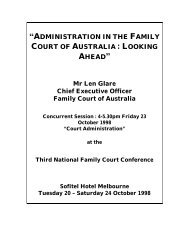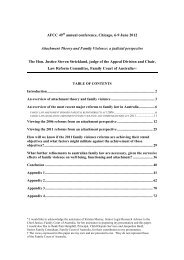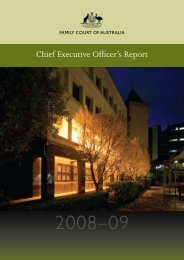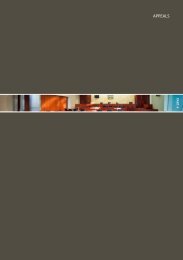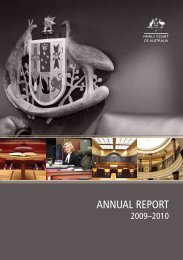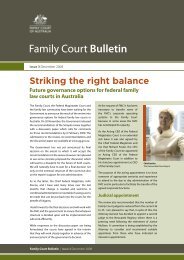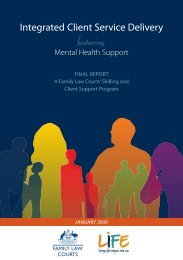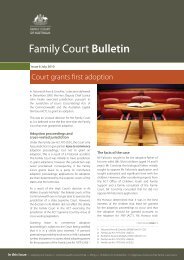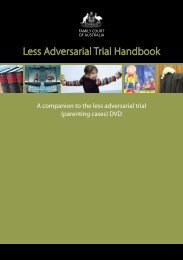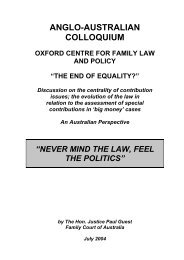Annual report [1997-98] - Family Court of Australia
Annual report [1997-98] - Family Court of Australia
Annual report [1997-98] - Family Court of Australia
You also want an ePaper? Increase the reach of your titles
YUMPU automatically turns print PDFs into web optimized ePapers that Google loves.
The <strong>Family</strong> <strong>Court</strong> <strong>of</strong> <strong>Australia</strong> – annual <strong>report</strong> <strong>1997</strong>-<strong>98</strong><br />
Launceston to complete her studies and sought an order for the children to reside with her.<br />
The trial judge found both parents capable <strong>of</strong> caring for the children but found the wife’s<br />
move to be motivated by self-interest and made orders that the children reside with the husband.<br />
The Full <strong>Court</strong> allowed the wife’s appeal, finding that the trial judge erred in taking<br />
the wife’s move into account as a negative aspect, as it was necessary if she was to complete<br />
her studies. The Full <strong>Court</strong> held that where a residence dispute is finely balanced, the happiness<br />
<strong>of</strong> the children in one household as compared to the other becomes a significant, almost<br />
determinant, factor in deciding where a child should live. As there was clear evidence that<br />
the children were suffering distress in the husband’s care which the husband had been unable<br />
to alleviate, the Full <strong>Court</strong> concluded that this was a case where the discretion <strong>of</strong> the trial<br />
judge could be substituted and orders were made for the children to reside with the wife.<br />
Contact – supervision required – unacceptable risk that father might harm children<br />
In Av A(19<strong>98</strong>) FLC 92-800, the wife had sustained horrific injuries as a result <strong>of</strong> an assault<br />
upon her in the former matrimonial home which appeared to be an attempt to kill her. The<br />
wife could not recall the assault but believed the husband was the perpetrator. There were<br />
a number <strong>of</strong> objective facts which supported the wife’s belief but by the time the husband’s<br />
application for unsupervised contact came before the trial judge, the police had not charged<br />
anyone with the <strong>of</strong>fence. The trial judge held that it was not for the <strong>Family</strong> <strong>Court</strong> to investigate<br />
criminal activity, even where such activity may have bearing upon the issues the<br />
court is called upon to decide and made orders for the husband to have unsupervised contact<br />
after an initial period <strong>of</strong> supervised contact. On appeal, the Full <strong>Court</strong> held that the<br />
proper approach was to determine whether the evidence was such as to establish that there<br />
would be an unacceptable risk to the children if they were to have unsupervised contact<br />
with the husband. The Full <strong>Court</strong> concluded that there was such a risk and made orders that<br />
the husband have supervised contact.<br />
Adding new grounds to a notice <strong>of</strong> appeal<br />
In Bradley v Weber (<strong>1997</strong>) FLC 92-770, the Full <strong>Court</strong> held that amendments to a Notice<br />
<strong>of</strong> Appeal, even those that radically alter the nature <strong>of</strong> the appeal, can be made as <strong>of</strong> right,<br />
providing they are made within the time limits imposed by the <strong>Family</strong> Law Rules and<br />
proper notice is given <strong>of</strong> the proposed amendment. In this case, the wife’s original Notice<br />
<strong>of</strong> Appeal sought only to appeal orders dismissing her application for spousal maintenance.<br />
Her amended Notice <strong>of</strong> Appeal filed a week before the appeal was due to be heard sought<br />
to appeal against orders in relation to alteration <strong>of</strong> property interests in addition to the<br />
orders for spousal maintenance. As the wife had complied with the prescribed time limits<br />
and had given proper notice <strong>of</strong> the proposed amendment, the court found she was entitled<br />
to proceed with her amended Notice <strong>of</strong> Appeal.<br />
Specific issues orders and s112AD<br />
In Vlug v Poulos (<strong>1997</strong>) FLC 92-778, the husband sought to have the wife dealt with for<br />
breaching an order appointing the parties joint guardians <strong>of</strong> the children <strong>of</strong> the marriage<br />
after the wife allegedly christened the children without reference to the husband and<br />
changed the schooling arrangements for the elder child. The trial judge found that a joint<br />
guardianship order which became a specific issues order as a result <strong>of</strong> the introduction <strong>of</strong><br />
45


![Annual report [1997-98] - Family Court of Australia](https://img.yumpu.com/37244799/50/500x640/annual-report-1997-98-family-court-of-australia.jpg)
